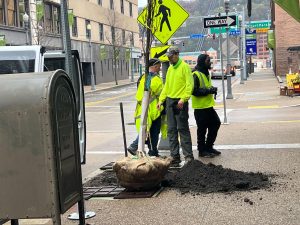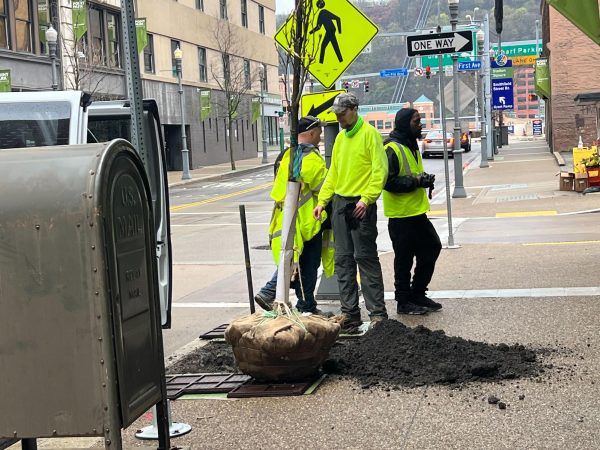Campus police implement new training simulation
Simulation technology enhances police training on appropriate firearm use
January 29, 2019
The Point Park Police Department has been using an audiovisual simulation to train campus officers on how to react to high-stress situations. The simulations have been in use by officers for at least a year, but are just now being publicly disclosed.
Assistant Vice President of Public Safety and Chief of Police Jeffrey Besong stated that the simulations and the equipment used to operate them was funded by private donations from eight anonymous donors last year. Besong also claimed that Point Park is one of just a few colleges to host situational simulation training for campus police.
The simulations are performed in a small room where video clips are projected onto a blank wall. The officer that is in the programmed situation stands towards the projected screen while another officer directs the simulation at a nearby computer, acting as the dispatcher.
The room is additionally equipped with a surround sound system and red and blue police lights to amplify and immerse the officer in the simulation. An observation room with two windows sits in the back, where other officers or their superiors can watch and rate the training. On the wall sits a black sign that reads:
“When you’re under pressure you don’t rise to the occasion, you sink to the level of your training.”
Lt. Nicholas Black and Officer Matthew Mays demonstrated the simulation, with Black engaging with the screen and Mays as the dispatcher.
In the simulation, Black was equipped with a fake handgun loaded with a CO2 air cartridge to give the handgun the weight of a real gun. Black noted that officers will never use live ammunition in the simulations, and instead use a system similar to a light gun arcade game to shoot virtual targets. Officers also use other equipment they would use in the field during a simulation such as flashlights, tasers and assault rifles depending on the simulation.
Mays, acting as the dispatcher, described the situation that Black was about to experience. As the simulation began, a video clip of a man attempting to steal a bicycle from a bike rack was shown on the screen. Black began to ask the bike thief questions before demanding that he drop his bolt cutters and back away from the rack.
Then, Mays would select a clip that would respond to how Black approached the thief. In the first attempt, Black remained firm and attempted to verbally diffuse the thief with success as the thief dropped his bolt cutters and complied. In the second attempt, Mays had the thief react violently to Black’s assertive approach – prompting Black to draw his weapon before the thief could attack.
Mays detailed that the simulations are based on real-life scenarios that officers have experienced. Ti Training, a company that markets training simulations and equipment to the police and military, sends Point Park Police updated scenarios every three months. He also stated that amount of variables shown by officer approaches and the swath of new simulations allows for “unlimited scenarios”.
Black maintained that the simulations are not for firearm practice, but to heighten the trainee’s situational awareness and reduce officer complacency. The simulations are solely used to improve officer decision-making and de-escalation techniques through either verbal, hands-on or presence-based situations.
“It teaches you when to meet the force with a force,” Black said.
The new simulation training has been met with a hearty response; not only from Point Park Police, but from students as well.
Junior acting major Ariel Squire believes the simulation is a good step in improving how officers interact and deal with situations and supports the use of mindset training.
“Any authority figure holding a gun should have situational training,” Squire said.
Senior transfer and business management major Josh Lepish stated that the simulations would help students fully rely on the police when prompted with scary situations.
Lepish, who has only recently become acclimated to city life, was rattled when he first experienced Pittsburgh and the importance of inner-city public safety.
“Buffing up safety will always be an improvement,” Lepish said.
Freshman broadcast production and media management major Ruben Roldan says that the simulations would help students especially.
Roldan expressed the importance of officers being able to “trust their gut” and how mindset training simulations would greatly improve their ability to do so. He also believed that people who criticize the ability of the police force and it’s actions should experience the simulations to understand the stress and snap-decisions that officers endure.















Amy Saunders • Aug 1, 2022 at 3:52 am
I strongly agree with your statement that any kind of simulation involving ammunitions must be conducted in a controlled environment and its surrounding people must be informed to prevent unexpected reactions. This makes me think of my local police patrol which is planning to carry out a hostage simulation in our neighborhood next week. They have to definitely consult an expert to make sure everything goes well later. https://www.t4eguns.com/t4e-accessories